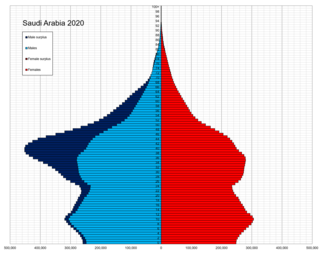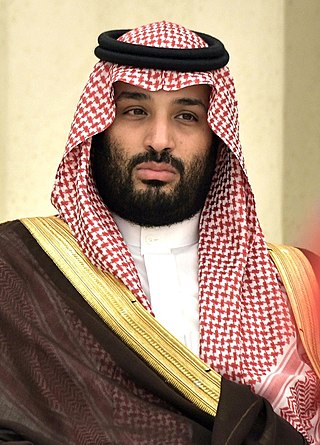Related Research Articles

Saudi Arabia is the fourth largest state in the Arab world, with a reported population of 35,013,414 as of 2018. 38.3% of inhabitants are immigrants. Saudi Arabia has experienced a population explosion in the last 40 years, and continues to grow at a rate of 1.62% per year.

The economy of Saudi Arabia is the largest in the Middle East and the eighteenth largest in the world. A permanent and founding member of OPEC, Saudi Arabia is also a member of the G20 forum as one of the world's largest economies.

The Saudi Arabian Armed Forces (SAAF), also known as the Royal Saudi Armed Forces, is part of the military forces of the Kingdom of Saudi Arabia. It consists of the Saudi Arabian Land Forces, the Royal Saudi Navy, the Royal Saudi Air Force, the Royal Saudi Air Defense, and the Royal Saudi Strategic Missile Force. The King of Saudi Arabia is the commander-in-chief of all the Military Forces and forms military policy with the Ministry of Defense and the Ministry of Interior. The five Armed Forces are among eight military forces of Saudi Arabia, with the others including the Saudi Arabian National Guard, the Saudi Royal Guard Regiment and Saudi Arabian Border Guards.

Foreign relations of Saudi Arabia are the diplomatic and trade relations between Saudi Arabia and other countries around the world. The foreign policy of Saudi Arabia is focused on co-operation with the oil-exporting Gulf States, the unity of the Arab world, Islamic solidarity, and support for the United Nations. In practice, the main concerns in recent years have been relations with the US, the Saudi Arabian–led intervention in Yemen, the Israeli–Palestinian conflict, Iraq, the perceived threat from the Islamic Republic of Iran, and the effect of oil pricing. Saudi Arabia contributes large amounts of development aid to Muslim countries. From 1986 to 2006, the country donated £49 billion in aid.

The Cooperation Council for the Arab States of the Gulf, also known as the Gulf Cooperation Council, is a regional, intergovernmental, political, and economic union comprising Bahrain, Kuwait, Oman, Qatar, Saudi Arabia, and the United Arab Emirates. The council's main headquarters is located in Riyadh, the capital of Saudi Arabia. The Charter of the GCC was signed on 25 May 1981, formally establishing the institution.

Saudi Arabia, officially the Kingdom of Saudi Arabia (KSA), is a country in Western Asia. It covers the bulk of the Arabian Peninsula, and has a land area of about 2,150,000 km2 (830,000 sq mi), making it the fifth-largest country in Asia, the second-largest in the Arab world, and the largest in Western Asia and the Middle East. It is bordered by the Red Sea to the west; Jordan, Iraq, and Kuwait to the north; the Persian Gulf, Qatar and the United Arab Emirates to the east; Oman to the southeast; and Yemen to the south. Bahrain is an island country off its east coast. The Gulf of Aqaba in the northwest separates Saudi Arabia from Egypt and Israel. Saudi Arabia is the only country with a coastline along both the Red Sea and the Persian Gulf, and most of its terrain consists of arid desert, lowland, steppe, and mountains. Its capital and largest city is Riyadh. The country is home to Mecca and Medina, the two holiest cities in Islam.

Human rights in Saudi Arabia are a topic of concern and controversy. The Saudi government, which mandates both Muslim and non-Muslim observance of Islamic law under the absolute rule of the House of Saud, has been accused of and denounced by various international organizations and governments for violating human rights within the country. The authoritarian regime ruling the Kingdom of Saudi Arabia is consistently ranked among the "worst of the worst" in Freedom House's annual survey of political and civil rights.

Salman bin Abdulaziz Al Saud is King of Saudi Arabia, reigning since 2015. He also served as Prime Minister of Saudi Arabia from 2015 to 2022. The 25th son of Ibn Saud, the founder of Saudi Arabia, he assumed the throne on 23 January 2015. Prior to his accession, he was Crown Prince of Saudi Arabia from 16 June 2012 to 23 January 2015. Salman is the 3rd oldest living head of state and the oldest living monarch besides being the country's first head of state born after the unification of Saudi Arabia.

The Basic Law of Saudi Arabia is a constitution-like charter divided into nine chapters, consisting of 83 articles. The Basic Law states that the constitution of Saudi Arabia is "the Holy Qur'an, and the Sunna (Traditions)" of the Islamic prophet Muhammad. However, the Basic Law contains many characteristics of what might be called a constitution in other countries. The Basic Law is in accordance with a Salafi understanding of Sharia and does not override Islamic laws.
The Saudi Crown Prince's Cup was the Saudi Arabian annual cup competition. It was the oldest domestic football competition in Saudi Arabia, its first edition was held in 1956–57, but was not crowned from 1975 until 1990. The competition consists of teams from the top two tiers of Saudi league football, as well as the competition runs from August until February.

Women's rights in Saudi Arabia are a topic of concern and controversy internationally. Saudi women have experienced major rights reforms since 2017, after facing religious fundamentalist dominance dating from 1979.

Abdullah bin Abdulaziz Al Saud was King and Prime Minister of Saudi Arabia from 1 August 2005 until his death in 2015. Prior to his ascension, he was Crown Prince of Saudi Arabia since 13 June 1982. He was the tenth son of King Abdulaziz, the founder of Saudi Arabia.
Islam is the state religion of Saudi Arabia. The government of Saudi Arabia has been criticized for its restrictions on religious freedom. Law requires citizens to be Muslim, and, public worship by adherents of religions other than Islam is forbidden. Any non-Muslim foreigner attempting to acquire Saudi Arabian nationality must convert to Islam. Furthermore, Hanbali is the official version of Sunni Islam and adherence to other sects is restricted. According to a 2012 online poll by WIN-Gallup International, 5% of 502 Saudi Arabians surveyed stated they were "convinced atheists".

Hajj is an annual Islamic pilgrimage to Mecca, Saudi Arabia, the holiest city for Muslims. Hajj is a mandatory religious duty for Muslims that must be carried out at least once in their lifetime by all adult Muslims who are physically and financially capable of undertaking the journey, and of supporting their family during their absence from home.

Muhammad bin Nayef Al Saud, colloquially known by his initials MBN or MbN, is a former Saudi Arabian politician and businessman who served as the crown prince and first deputy prime minister of Saudi Arabia from 2015 to 2017 and as the minister of interior from 2012 to 2017.

Salem Mohammed Shafi Al-Dawsari is a Saudi Arabian professional footballer who plays as a winger for Saudi Professional League club Al Hilal and the Saudi Arabia national team.

Mohammed bin Salman Al Saud, colloquially known by his initials MBS or MbS, is Crown Prince and Prime Minister of Saudi Arabia. He also serves as the chairman of the Council of Economic and Development Affairs and chairman of the Council of Political and Security Affairs. He is considered the de facto ruler of Saudi Arabia, being deemed as such even before his appointment as prime minister in 2022. He served as minister of defense from 2015 to 2022. He is the seventh son of King Salman.

On 26 March 2015, Saudi Arabia, leading a coalition of nine countries from West Asia and North Africa, launched an intervention in the Yemeni Civil War in response to calls from the president of Yemen Abdrabbuh Mansur Hadi for military support after he was ousted by the Houthi movement. The conflict ignited between the government forces, the Houthi rebels and other armed groups after the draft constitution and power-sharing arrangements collapsed, despite progress in the political transition led by the United Nations at that time, leading to an escalation of violence in mid-2014. The Houthis and allied units of the armed forces seized control of Sana’a and other parts of the country in September 2014 and in the following months. This prompted President Hadi to ask Saudi Arabia to intervene against the Iranian-backed Houthis.
Saudi Arabia's involvement in the Syrian Civil War involved the large-scale supply of weapons and ammunition to various rebel groups in Syria during the Syrian Civil War.
References
- ↑ "2015 World Championship Roster" (PDF). IHF. Archived from the original (PDF) on 2 February 2015. Retrieved 15 January 2015.
